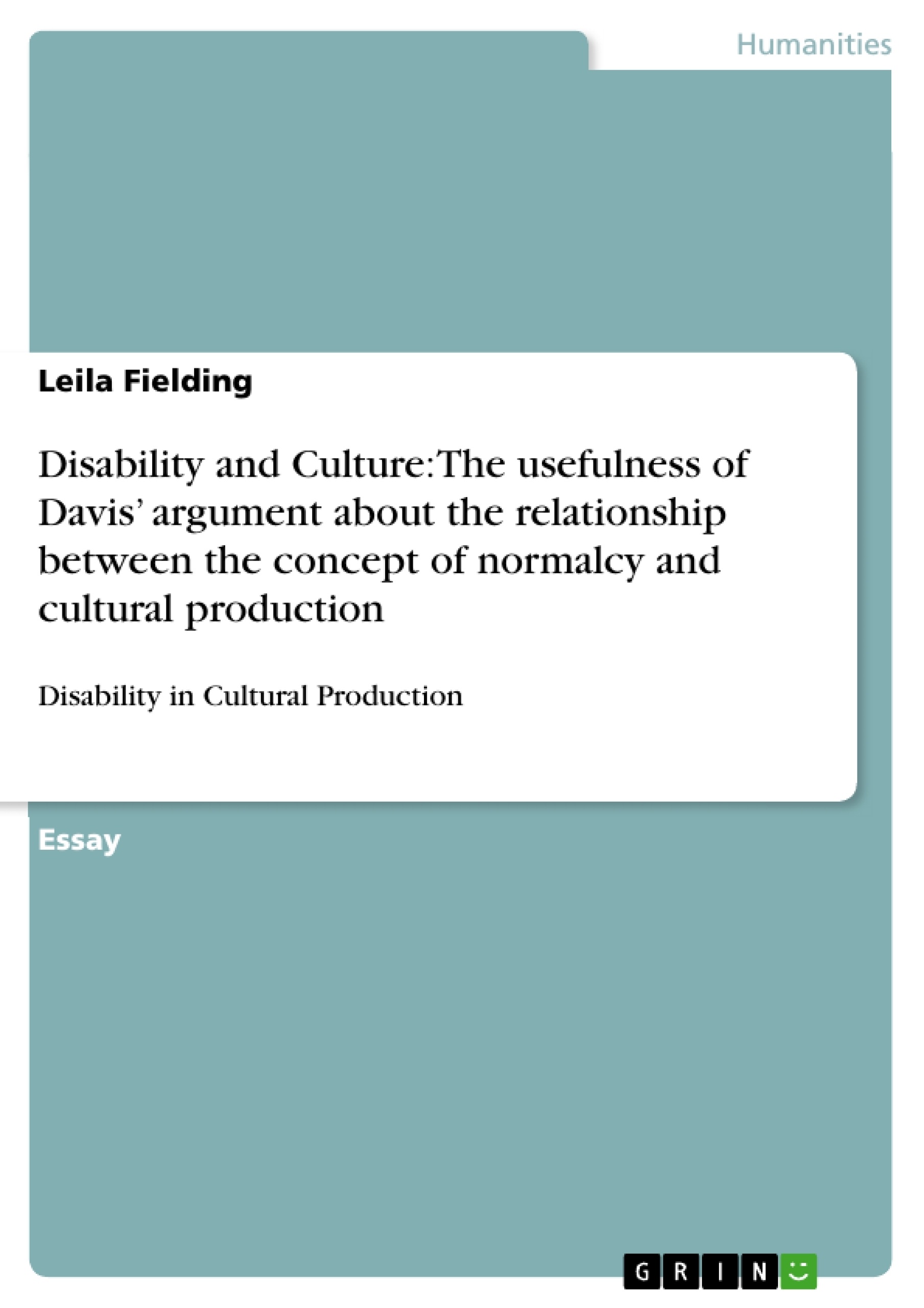Excerpt
Disability and Representation
“The implications of the hegemony of normalcy are profound and extend into the very heart of cultural production” (Lennard Davis). With reference to at least two cultural texts, explain and assess the usefulness of Davis’ argument about the relationship between the concept of normalcy and cultural production.
Case study: Science Fiction
Texts:
1) H. G. Wells, The Country of the Blind[1]
2) John Varley, The Persistence of Vision[2]
"Then view you pensive, interesting group,
Hard is their lot - with poverty they stoop,
The shades of darkness on their eyelids dwell,
They know not how to chase the mystic spell.
View nature's soul! doth not that god of day!
Pour in delight upon the visual ray?-
View Flora's beauties in their gay attire,
Say, do not these a secret joy inspire?
The charms of nature, and the works of art,
To different minds their various joys impart;
Save where the darken'd optics ne'er could learn,
Objects of arts, or nature to discern.
This night of nature striving to illume
By their honest toil, to cheer this visual gloom,
Fair Charity with kind, unwearied hand,
Supports the cause of virtue's chosen band.
Their aim is blessings on the blind to pour,
Make useful that, which useless was before;
Yes, charity will flow the useful grain;
And cheerful, industry each good obtain.”[3]
Disability is a natural part of the human condition. Almost everyone you cross paths with will possess some form of deviance from the socially enforced ideological norm, whether or not they choose to let this be apparent. Every person will, at some point, experience some form of impairment or disability during their lives; be it brought on by disease, depression, old age, injury or deterioration. “Disabilities are less the property of persons than they are moments in a cultural focus. Everyone in any culture is subject to being labelled and disabled.”[4] Yet, despite the temporality of ability, disability is still marginalised, distorted and concealed within mainstream culture.[5] Types and categories of disability are extensive, escalating and erratic. It is therefore absurd that society clings to the notion of normalcy like an anxious child clutching its mother’s hand. People are disabled by culture, as well as by society. Depending on how difference is perceived and acknowledged, people can be enabled or disabled by those around them. Disabilities are therefore manufactured by society and represented by culture.[6]
Theorists in the field of disability studies are seeking to address cultural issues which until recently have been overlooked. Lennard Davis is one such scholar who recognises that culture is a powerful indication of social order. Davis claims that the dominance of normalcy in our society, or the superiority of the able-bodied, is so embedded within every aspect of our lives that it often forms the core of cultural medium. Literature, films, media and advertisements, for example, all largely revolve around a concept of normalcy which has become so ingrained in our society, so unquestionably accepted, that we hardly notice the imbalance anymore. Davis presents an argument which challenges the hegemony of normalcy, identifying a reflection of social perceptions of disability in cultural production. The dominance of able-bodied individuals; and the marginalisation of disabled people in cultural depictions symbolises a history of classifying the disabled as inadequate, inferior and deviant. Cultural representations are a fundamental aspect of the disability debate, as they maintain the superiority of the non-disabled due to the profound influence which they have on the public. We need only look at the powerful discriminatory depictions of Jews in Nazi propaganda to confirm this point. Culture is both a product and driving force of, the supremacy of the able-bodied. This essay will focus on portrayals of disability in the science fiction genre, hoping to demonstrate that this genre is a platform which can intensify or contest traditional stereotypes of disability. Within this framework, Davis’ argument is useful by way of addressing that the concept of normalcy is routinely used as a basis to create deviation in culture. These deviations depend on the context, yet almost always exist in cultural medium.
[...]
[1] H. G. Wells, ‘The Country of the Blind’ in The Country of the Blind and Other Stories (1911), Project Guttenburg ebook #11870, 2004, Disability and Representation Course Materials, Manchester, 2010, pp. 1-21.
[2] John Varley, The Persistence of Vision, in Varley, John, The Persistence of Vision and other stories (1984)
[3] Poem reproduced from the Report of the Bristol Asylum, 1799. No Author’s name is provided. The poem is simply signed a philanthropist, Editor Simon Hayhoe, http://www.blindnessandarts.com/publications/ThesisforWebPublication/Appendix6.htm, accessed 2/4/2011
[4] Ray McDermott and Hervev Arenne, ‘Culture as Disability’, Anthropology and Education Quarterly, Vol. 26, No. 3 (1995), pp. 324-348.
[5] Lennard Davis, Enforcing Normalcy: Disability, Deafness and the Body (London: Verso, 1995)
[6] McDermott and Arenne, ‘Culture as Disability’, pp. 324-348.
- Quote paper
- BA HONS Leila Fielding (Author), 2012, Disability and Culture: The usefulness of Davis’ argument about the relationship between the concept of normalcy and cultural production, Munich, GRIN Verlag, https://www.grin.com/document/203184
Publish now - it's free






















Comments